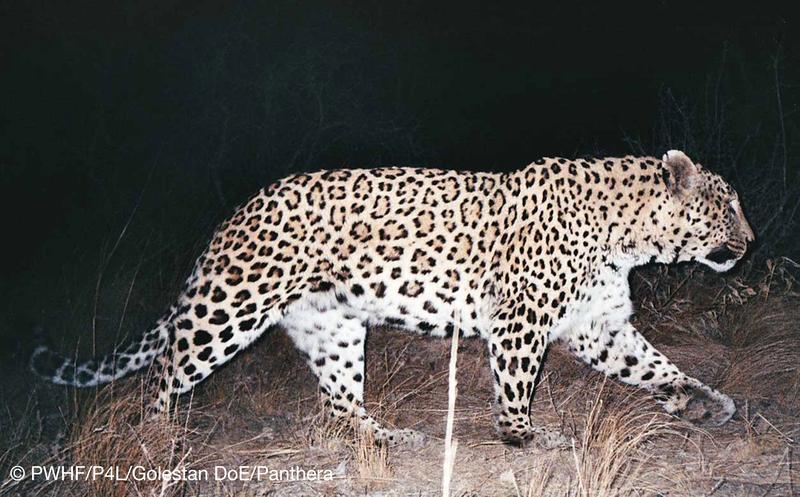
Improved Veterinary Services Boost Leopard Conservation Efforts

Persian leopard in Golestan National Park, Iran, who was part of a study and ran into a camera trap.
Photo: PWHF/P4L/Golestan DoE/Panthera
In the surroundings of wildlife conservation areas, human-wildlife conflicts over livestock predation are common. One example is the Golestan National Park in Iran. It retains the largest single population of the globally endangered Persian leopard.
In all 34 villages around the national park a German-Iranian research team led by scientists of the University of Göttingen studied the main determinants of livestock predation.
The conservation biologists found that the more villagers were dissatisfied with veterinary services provided by state-supported vaccination crews, the more likely they were to lose livestock and dogs to leopard predation. The findings were published in the open access journal PLoS One.
Since many villagers around the national park make their living from livestock, significant losses of their income caused by intense predation provoke hostile attitudes and persecution of leopards. In talks with local people to secure their economical basis as well as to promote conservation of that big cat, the veterinary system for livestock came up as a central problem.
“Surprisingly, satisfaction with veterinary services was the only factor that allowed to predict the probabilities of conflicts and killing of livestock and dogs,” says leading researcher Dr. Igor Khorozyan from the University of Göttingen.
Cattle, sheep and goats in the region are affected by fascioliasis, foot-and-mouth, hoof infections, echinococcosis and tick-borne diseases. “Perhaps hoof infection limits the fleeing behavior of livestock and exposes them to higher predation,” says Dr. Khorozyan.
“Villagers complained that vaccination crews often come too late when diseases are already spread and belated vaccination is ineffective. Services provided by private veterinarians are mostly unaffordable.”
In addition, the heavy predation of leopards on dogs was of particular concern for the conservationists. Because dogs are not vaccinated in the study area, they can act as reservoirs of diseases to which leopards are susceptible, such as canine distemper, rabies, tuberculosis and mange.
“We therefore appeal to improve the effectiveness of veterinary services so as to minimize livestock and dog losses to diseases and leopard predation,” says Dr. Matthias Waltert, conservation scientist at the University of Göttingen and coordinator of the German-Iranian research team.
Effective vaccination around the park requires good coordination between different administrative bodies to ensure timely vaccination, diagnostics and treatment of domestic animals. “Better provision of veterinary services will also increase public sympathy to nature conservation, and thus improve the synergy between rural livelihoods and protected areas.”
Original publication: Khorozyan, I., Soofi, M., Hamidi, A.K., Ghoddousi, A. and Waltert, M. (2015) Dissatisfaction with veterinary services is associated with leopard (Panthera pardus) predation on domestic animals. PLoS One, 10(6): e0129221, doi:10.1371/journal.pone.0129221
Contact:
Igor Khorozyan, PhD
Georg-August-Universität Göttingen
Faculty of Biology
Johann-Friedrich-Blumenbach Institute of Zoology and Anthropology – Conservation Biology
Bürgerstraße 50, 37073 Göttingen
Phone: +49 551 39-5633
Email: igor.khorozyan@biologie.uni-goettingen.de
Website: http://www.uni-goettingen.de/en/483588.html
PD Dr. Matthias Waltert
Georg-August-Universität Göttingen
Faculty of Biology
Johann-Friedrich-Blumenbach Institute of Zoology and Anthropology – Conservation Biology
Bürgerstraße 50, 37073 Göttingen
Phone: +49 551 39-5638
Email: mwaltert@uni-goettingen.de
Website: http://www.uni-goettingen.de/de/pd-dr-matthias-waltert/117392.html












